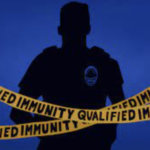Qualified Immunity – Should Police Be More Accountable?
 Does Qualified Immunity Protect Cops at the Expense of Civil Rights?
Does Qualified Immunity Protect Cops at the Expense of Civil Rights?
Reforms aim to rebalance the need to hold police accountable while shielding individual officers from financial liability.
On January 8, 2014, officers Brad Bracey and Spencer Harris responded to a burglary-in-progress call, and they brought “Iwo”, their trained police dog. The officers followed Iwo to the basement of a nearby house where they found the suspect, Alexander Baxter, hiding. Although Baxter surrendered peacefully, the officers nonetheless commanded Iwo to apprehend the suspect, which the dog did according to its training, by biting Baxter’s arm.
Baxter claimed the officers violated his constitutional rights by commanding a canine apprehension after he had already peacefully surrendered, and he filed a lawsuit against the officers relying on a Supreme Court ruling that says the Fourth Amendment protects individuals from an officer’s use of excessive force while making an arrest.
An appellate court tossed Baxter’s lawsuit and granted Bracey and Harris “qualified immunity.” As stated in the Supreme Court decision Pearson v. Callahan, “Qualified immunity balances two important interests – the need to hold public officials accountable when they exercise power irresponsibly and the need to shield officials from harassment, distraction, and liability when they perform their duties reasonably.” The term “public officials” includes law enforcement officers. In a very practical sense, qualified immunity makes it difficult for citizens to personally sue cops who violate their civil rights.
The merits of the qualified immunity doctrine are a matter of debate. Opponents suggest that the doctrine allows law enforcement officers to escape justice for violating citizens’ rights. Supporters contend that without qualified immunity, law enforcement officers – who already put their lives on the line to protect and serve – would also risk financial ruin for mistakes made on the job.
Rob High, a retired law enforcement officer and co-founder of D.O.P.E. the Movement, knows firsthand how difficult the job of a patrol officer can be. Rob says, “I don’t have any issue with qualified immunity for people who are in a position where the very nature of their work makes them a marked target.”
Attorney Lorenzo Banks is also a contributing partner to D.O.P.E., and throughout his career, he has handled many civil rights cases on behalf of victims. He believes that qualified immunity may create an environment where individual police officers are more likely to commit civil rights violations. “With that shielding,” Lorenzo says, “I would think that officers and agents of government know that they can kind of do whatever they want because they know there is a strong chance they will be dropped out of a civil lawsuit due to qualified immunity.”
Arkansas senator Tom Cotton strongly supports qualified immunity and notes that the doctrine doesn’t exempt individual officers from all civil rights lawsuits. The senator cites a comprehensive investigation by the Reuters news service showing that between the years 2017 and 2019, courts refused to grant officers qualified immunity in excessive force cases 43% of the time. Senator Cotton writes, “It is, by definition, ‘qualified,’ limited, and conditional. As the Supreme Court held in 1986, it does not protect ‘the plainly incompetent or those who knowingly violate the law.’”
The “Clearly Established Law” Test
Case law has evolved since the 1986 decision Senator Cotton cites. In 2001, a Supreme Court ruling established a two-part test for determining qualified immunity, indicating that courts should first decide whether a constitutional right had been violated and then “look at whether that right was clearly established at the time of the alleged conduct.” The term “clearly established” left some room for interpretation, and over the subsequent years, courts have been trending towards a stricter reading of the law. A subsequent ruling has established that, if a court finds that there isn’t a “clearly established” precedent for a particular act against a citizen, then the court can skip the first step for the sake of efficiency. For the strict legal purpose of determining immunity, it doesn’t matter if there was a civil rights violation if that right wasn’t already “clearly established.”
Reuters found the data “showed that appellate courts are ignoring the question of whether cops have violated a plaintiff’s constitutional rights” and they are “increasingly requiring a nearly identical case from the past to serve as a precedent that clearly establishes an officer’s actions as illegal.” When courts choose to ignore the question of whether a victim’s civil rights were violated, that specific violation doesn’t become part of the record, and therefore, it is not eligible for consideration as a precedent for future civil rights complaints.
The American Civil Liberties Union is working to reform qualified immunity, and they filed a petition to the Supreme Court on behalf of Alexander Baxter asking justices to “reverse the grant of immunity to the officers responsible for the dog attack” and to reconsider the Court’s position on the qualified immunity doctrine. The Court refused, upholding a lower court’s decision that the “use of the canine to apprehend Baxter did not violate clearly established law.” There wasn’t a “nearly identical” case to establish a precedent, so the officer was granted qualified immunity, and the qualified immunity doctrine remained unchanged.
Protection for “Plainly Incompetent Behavior”
Alexander Baxter makes an unsympathetic victim. It is undisputed that he was caught in the act of burglarizing a home and that he hid from police. Nonetheless, even criminals have civil rights, and not all victims are criminals nor are they always complicit in the events that led to their rights being violated.
In 2018, two dozen officers in Henry County, Georgia raided a residential home with flash-bang grenades and a battering ram, and they arrested the 78-year-old occupant, Onree Norris. The warrant, however, was issued for the address next door to Norris’ property, but that property didn’t match the description provided to officers who decided to raid Norris’ property instead – even though his property didn’t match the description either. Norris sued, but the case against the officers was thrown out because there was “no court precedent explicitly deeming the misconduct in question unconstitutional.” While Senator Cotton claims qualified immunity does not protect the “plainly incompetent,” the Norris case demonstrates otherwise.
Reason Magazine associate editor Billy Binion has collected stories involving incompetent officers who received qualified immunity in cases where there was no explicit court precedent that matched the identical circumstances of an alleged civil rights violation.
In 2017, officers tased a suicidal man who had drenched himself in gasoline – even though they were warned that doing so would cause the man to burst into flames. Because there was no previous court precedent that tasing a man drenched in gasoline violated his constitutional rights, the officers were granted qualified immunity in the wrongful death claim the victim’s family filed.
In 2014, Deputy Sheriff Matthew Vickers chased a criminal suspect into the backyard of a residential home where children were playing. After Vickers apprehended the suspect, Bruce the family dog appeared, and even though “no one appeared threatened by [Bruce],” as the court wrote, the officer shot at the dog, missing him, and striking a 10-year-old in the back of the knee. The family sued, and Vickers’ lawyers countered with a motion that argued the officer “was entitled to qualified immunity because case law had not staked out a ‘bright line’ indicating that the act of firing at the dog and unintentionally shooting [the 10-year-old] was unlawful.” The court granted immunity.
In 2015, LAPD officer Michael Guiterrez fired into a crowd of teenage boys because one of them was holding an Airsoft replica gun with a bright orange tip. Not only did the officer mistake the replica for a real gun – he didn’t even shoot the teen who was holding the replica; he accidentally shot one of the boy’s friends instead. A state court refused to grant the officer immunity, but Guiterrez appealed. The appellate court wrote, “Under the circumstances, a rational finder of fact could find that Gutierrez’s use of deadly force shocked the conscience and was unconstitutional under the Fourteenth Amendment.” However, they continued, “the panel held that because no analogous case existed at the time of the shooting, the district court erred by denying Gutierrez qualified immunity for this claim.”
The Gutierrez case shows that under the current case law, even when an officer’s actions are found to violate a citizen’s civil rights, the officer can be granted qualified immunity if there is no specific precedent for the officer’s exact actions. The Gutierrez case is not an outlier. While Senator Cotton notes that officers are refused qualified immunity 43% of the time, he fails to mention that 44% of the officers who did receive qualified immunity got it only because no prior precedent established that the force used was unlawful.
Alternative Paths to Justice
Despite the significant legal barriers, Attorney Lorenzo Banks says that qualified immunity doesn’t necessarily leave victims without legal recourse. “Qualified immunity only protects the individual officer,” he says. “It doesn’t protect the agency the officer works for.” Retired officer Rob High says, “If you can show that the city or agency knew about a pattern of behavior, or they didn’t provide proper training, or they condoned it and turned a blind eye, then the municipality could be on the hook.”
Senator Tom Cotton argues that there are ways to hold officers accountable outside the civil justice system. “Officers who violate department policies can be disciplined or fired, and those who commit crimes are criminally prosecuted just like anyone else.” Cotton points out that although officer Derek Chauvin was granted qualified immunity for the high-profile death of George Floyd, the family received a $27 million settlement from the city of Minneapolis, and Chauvin was prosecuted and convicted in a criminal court.
Despite the alternative paths to justice Senator Cotton describes, Lorenzo Banks stresses that when an officer is granted qualified immunity, it can create an obstacle to pursuing those options. Lorenzo says he is aware of judges who have dismissed entire cases because an individual officer was granted immunity. In certain circumstances, agencies can make arguments that they are not liable for the actions of individual officers. Sometimes those arguments work, leaving victims unable to pursue justice.
Efforts to Reform Qualified Immunity
Since courts have been putting more emphasis on the “clearly established law” test, it has resulted in officers being granted immunity despite some astonishingly egregious behavior. Some believe the test violates the spirit of the qualified immunity doctrine. Supreme Court Justice Clarence Thomas wrote a dissenting opinion in the Baxter v. Bracey dog bite case noting that “case law until the 1980s contain no support for this ‘clearly established law’ test,” and in a criticism of his own Supreme Court, he writes, “We have ‘substitute[d] our own policy preferences for the mandates of Congress’ by conjuring up blanket immunity, and then failed to justify our enacted policy.”
Civil rights attorney Lorenzo Banks is against qualified immunity in its current form, but he acknowledges that “there does need to be some type of protection for individuals who are trying to reasonably and responsibly do their jobs but ultimately end up making an honest mistake. Otherwise,” he says, “we won’t have many officers who are willing to do the job.”
Most qualified immunity reform advocates recognize the need for some personal protections for individual officers – as long as the agencies that employ those officers inherit the liability associated with officers’ individual actions. The Institute for Justice has created model legislation for local and state governments that circumvent the controversial “clearly established law test” while protecting officers from individual financial responsibility. Colorado and New Mexico have passed laws akin to the Institute for Justice’s model, and other state legislatures are considering similar bills.
The qualified immunity doctrine has evolved significantly over the last several decades making it measurably harder for citizens to hold law enforcement officers accountable for civil rights violations. There are efforts, however, to shift the momentum and rebalance the interests of holding public officials accountable while shielding them from the liability they are exposed to as public servants. Lorenzo Banks says that regardless of whether an individual officer can be held personally liable for a civil rights violation, victims still have a path to justice, and it is important for victims to stand up for themselves and hold law enforcement agencies accountable, hopefully, prompting them to make the changes needed to protect the civil rights of the citizens they serve – now and in the future.unity
 SHAWN VINCENT – LITIGATION CONSULTANT
SHAWN VINCENT – LITIGATION CONSULTANT
Shawn Vincent is a litigation consultant who helps select
juries in self-defense cases, and he manages public interest
of high-profile legal matters. If you have any questions for
Shawn, or would like topic specific articles, please send your
request to dopethemovementinfo@gmail.com attention Shawn Vincent Articles
Leave a Comment
You must be logged in to post a comment.


